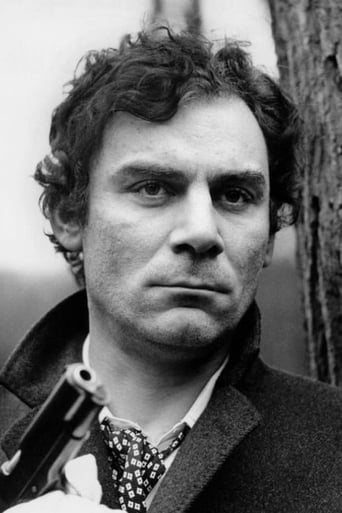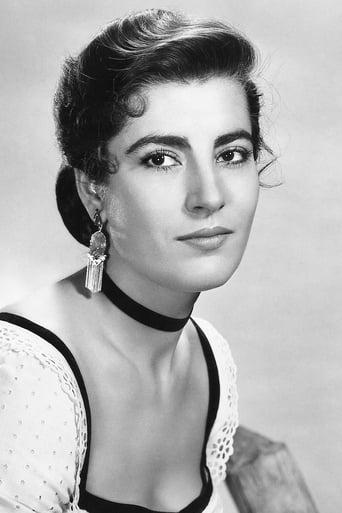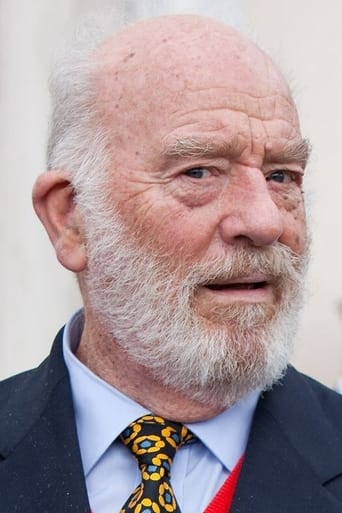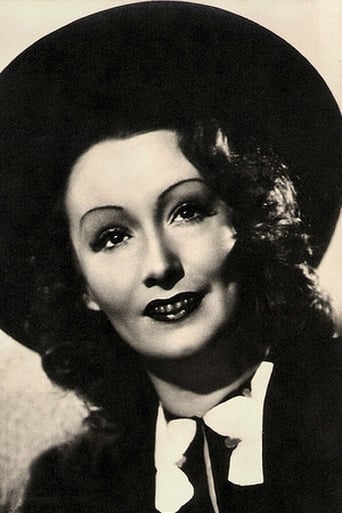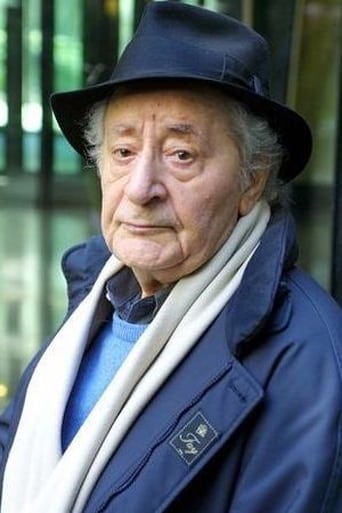Jeanskynebu
the audience applauded
Platicsco
Good story, Not enough for a whole film
Dirtylogy
It's funny, it's tense, it features two great performances from two actors and the director expertly creates a web of odd tension where you actually don't know what is happening for the majority of the run time.
Derry Herrera
Not sure how, but this is easily one of the best movies all summer. Multiple levels of funny, never takes itself seriously, super colorful, and creative.
Eumenides_0
Elio Petri's We Still Kill The Old Way opens with a beautiful aerial shot of Sicily that establishes the importance of the island's natural landscape to the story. Wherever characters go, the sea or Mount Pellegrino always appear behind them. It's a beautiful landscape, mocking all the ugliness bubbling in its urban centres.The town pharmacist, Manno (Luigi Pistilli – fans of Spaghetti Westerns will immediately recognize his face) receives a letter threatening him of death. It's the sixth that month and he's still alive so he doesn't take it seriously. But the next day, during a hunting trip he and his friend, Prof. Roscio (Salvo Randone), are murdered.We could say that one of the film's theme is indifference. Most people seem indifferent to the double homicides. They certainly regret the death of Prof. Roscio, which was probably accidental, a typical example of being in the wrong place at the wrong time. There are no regrets for Manno, the town philanderer. You mess with another man's wife, you get old-fashioned justice. When the relatives of a young girl Manno was seeing are arrested, the case seems closed. No point asking more questions. As Jack Nicholson says in Chinatown, let sleeping dogs lie.Paolo Laurana (Gian Maria Volonté) refuses to let sleeping does lie and starts investigating. An intellectual loner and leftist sympathiser, Laurana, a teacher, is different from his townsfolk. Analysing one of the death letters, he discovers the letters were cut from the L'Osservatore Romano, the Vatican's official newspaper. Knowing that the suspects are illiterate and discovering that very few people receive this newspaper in town, he continues his investigation to have the men freed.His investigation makes him to grow close to Luisa Roscio (Irene Pappas), the deceased's widow, and her cousin, the lawyer Rosello (Gabriele Ferzetti), who's taken the defense of the suspects. Through Luisa, Laurana discovers that Prof. Roscio was actually the target and the death threats against Manno just a pretext. It seems the professor had discovered evidence that someone important in town was involved in corrupt businesses.The story is sadly predictable and takes us through a web of intrigues involving the clergy, the senate, the town's influential men, and possibly the Mafia (although the word itself is never spoken). It's the typical story of a naïve man who stumbles upon corruption and dark secrets in an apparently idyllic place. How much of the story's weakness is due to the original novel by Leonardo Sciascia or the adaptation by Petri, Ugo Pirro and Jean Curtelin, is anyone's guess. But Sciascia, a celebrated author in Italy, did express disappointment over the screenplay.The strength of the movie lies in the cast. Gian Maria Volonté is unstoppable and perfectly captures Laurana's naïveté and aloofness. He's an erudite person but inattentive, incapable of seeing what goes on around him. This flaw is his doom and leads directly to the climax, the best part of the story, an act of betrayal so unexpected and emotionally cruel that I was heartbroken for Laurana.Irene Pappas also gives a fine performance as the widow Luisa (funny, in every movie I've seen her she always plays a widow. In defence of her lack of variety, she does look great in black). Less expansive than Volonté, Pappas acts mostly with her vivid eyes, revealing a personality that has little to say but is always calculating. Her expression of uncertainty and regret at the end of the movie, which is also the beginning of her wedding, encapsulates her character's essence and, like the beautiful landscape that contrasts with the horrible crimes, is at odds with the finale's festive tone.Elio Petri, Gian Maria Volonté and Ugo Pirro met for the first time in this movie. So it's of historical curiosity to their fans. Although they went on to make masterpieces together, the simplistic We Still Kill The Old Way is not to be sneered at, even if it tastes like a mere appetiser for their future successes.
MARIO GAUCI
Goodish blend of Mafia movie (still pretty much uncharted territory at the time) and political thriller, with a hesitant romance thrown in for good measure; the result is generally absorbing, thanks largely to uniformly excellent performances, gleaming location photography (Sicily, of course) and a wonderful score by the ever-reliable Luis Enrique Bacalov. Heading the cast is Gian Maria Volonte': the film launched the political/social conscience phase of his career after a stint doing Spaghetti Westerns. His character is that of an intellectual loner who finds himself in over his head when he starts probing into the assassination of two friends – including philanderer Luigi Pistilli – which leads to his falling for the other's wife (Irene Papas). Though the identity of the villain (as ever, an eminent member of the community and far closer to the hero than he envisaged) comes as no real surprise, the investigation – involving, among other things, the hushed participation of cleric and senator alike – and the disquieting revelations that emerge from it, lends the whole a deeply cynical tone (culminating in the downbeat climax depicting Volonte''s own extreme fate) while cementing the Mafia's reputation as strictly a 'family business'. The Italian DVD includes an interesting half-hour featurette detailing the making and reception of the award-winning film (including the fact that the author of the source novel, Leonardo Sciascia, was dissatisfied with how the script turned out); the interviewees are co-scriptwriter Ugo Pirro, the wife of the late Elio Petri, and composer Bacalov (who is regretful that, given his felicitous working relationship with the director here, the opportunity never arose for another collaboration).
VanDerGraafCamel
At the beginning of the movie a pharmacist receives an anonymous letter that threatens him of death. And the murder actually happens. Seems very simple but nothing is what it seems and the journey to the truth will be long and difficult. The book is excellent and the movie is at par with it and very faithful to the romance. Great direction. Incredible cast with Gabriele Ferzetti in his best interpretation together with the one in "C'era una volta il West" and Gianmaria Volonté simply beyond reach as always. Many other great actors. Yes I am an enthusiast 'cause there's not a word or a shot out of place in this movie and the plot is ingenious. Who is going to see this film for the first time will be taken away by the developments (the pace seems to be calm but looking in between the kinks you may realize that many things are going rapidly on). Trying to figure out what is the kernel of the happenings and the "reasons" for the murder is a very interesting exercise but it's highly unlikely for the spectator not to experience a big surprise at the end. In my opinion Elio Petri at his best (I mean at the same level of his other masterwork: La classe operaia va in Paradiso).
susanascot
Paolo Laurana is a kind of leftist intellectual who chances to be intrigued by a mysterious double murder in the Sicily of mid Sixties. In his personal detection for murder's instigators, he will run into a plot in which both politicians and mafia racketeers are involved. So curiosity will become a very dangerous affair. Taken from a novel by Leonardo Sciascia (1921-1989), A ciascuno il suo (1967) is a film where high rank acting is at its top. Cast (Gianmaria Volonté, Irene Papas, Gabriele Ferzetti, Salvo Randone, Luigi Pistilli. Mario Scaccia, Leopoldo Trieste) is perfect and well-combined, direction (Elio Petri, 1929-1982) is powerful and impressive. If compared to the novel, Elio Petri's film (written with Ugo Pirro) may seem short of that illuministic pessimism that breathes through Sciascia's books, but Laurana's rationalistic search for truth retains that `bitter taste of intelligence' which is one of the major feature of Sciascia's characters. A key film to understand historical condition of Italy in the Sixties.
